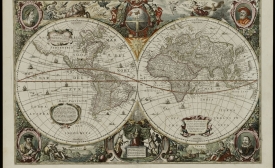geopolitics

Shaun Riordan's look at the state of geopolitics.
America’s political, national security, and foreign policy elites continue to ignore the basics of geopolitics that have shaped the fate of world empires for the past 500 years. Consequently, they have missed the significance of the rapid global changes in Eurasia that are in the process of undermining the grand strategy for world dominion that Washington has pursued these past seven decades.
Indeed, in many ways Fashion Week told a tale of brands eschewing the escapism normally associated with couture, opting instead to connect it to the real world. At varying levels and degrees of success.
The world is just a few days away from witnessing the start of the 2014 Winter Olympics. This year, the games will be held in the Russian summer resort of Sochi. Sochi, known as a longtime retreat for the Communist elite, will be hosting history’s most expensive Olympics, with a bill of $51 billion.
In my opinion, Russia is relatively on a par with its major geopolitical rivals, as far as "hard power" is concerned: we have the military, resources and economic power. As for "soft power", unfortunately, I believe this parity has been significantly impaired. Sadly, Russia’s reputation and image in the world is much worse than the real situation in the country.
I write in the belief that soft power as a force multiplier for imperial geopolitics is to be viewed with the greatest suspicion, but as an alternative to militarism and violence is to be valued and adopted as a potential political project that could turn out to be the first feasible utopia of the 21st century.
When I became secretary of state in early 2009, there were questions about the future of America’s global leadership. We faced two long and expensive wars, an economy in free fall, fraying alliances and an international system that seemed to be buckling under the weight of new threats.
Growing support is evident for the concurrent usage of both “East Sea” and “Sea of Japan” to refer to the body of water located between the Korean Peninsula and the Japanese Archipelago.







